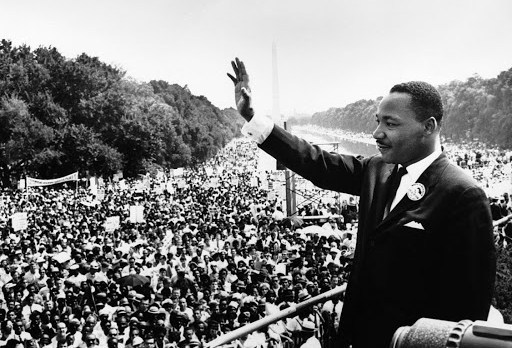Over the weekend, watching old videos and news stories, I found myself as moved as ever by the stunning oratory of the Reverend Doctor Martin Luther King, Jr., who made great use of imagery, and understood the power of cadence: how to energize an idea with the forward-thrust of repetition. He knew how to prompt the memory retention of a listener with alliteration: “ . . . they will not be judged by the color of their skin but by the content of their character.”
Great oratory is about more than being able to smoothly read a teleprompter, or sufficiently rehearse (or over-rehearse) a bit of rhetoric. Great oratory requires both a love of ideas and the words that bring them forth and make them seem not just plausible but noble, not just noble but unstoppable. Great oratory can so enlarge a thought that everyone listening wants to ride on its wings to the soaring heights. In World War II, Winston Churchill had inspired Britain in just that way:
We shall fight on the beaches, we shall fight on the landing grounds, we shall fight in the fields and in the streets, we shall fight in the hills; we shall never surrender . . .
Fine structure. powerful imagery, delivered in a voice full of certitude: great oratory.
We are missing that in the 21st century. Our current crop of leaders seem unable to find poetry in their texts, or even to purposely include it. Whether this is because there is something lacking within them or because they believe their audiences too uneducated to appreciate a well-struck image or relate to metaphor, I cannot say. Our national leaders are all highly credentialed people, but I am not sure that is the same thing as being broadly educated.
Read more: Does the culture rely too much upon credentials?
Former U.S. President Bill Clinton was a very good speaker, indeed; his well-documented love of talk, and the clear delight he took in using words—in pronouncing them, teasing them, timing their release and even droppin’ the occasional “g”—made him an entertaining speaker. Ronald Reagan was also very good, and with his actor’s training he was capable of putting across the powerfully poetic image, as he did when eulogizing the Challenger astronauts. Thanks to his then-speechwriter, Peggy Noonan—the Fairleigh Dickinson graduate who knew and drew upon on the words of John Gillespie Magee and placed them perfectly into context—Reagan pronounced, “Oh, I have slipped the surly bonds of earth . . . put out my hand, and touched the face of God.”
And in those scant lines, with the economy of language only poetry brings, the president lifted a nation off its knees and into wonder.
Perhaps the last great American orator was Bobby Kennedy; like Reverend King, he understood the techniques of oratory: cadence, repetition, alliteration. But RFK also had the ability to extemporaneously pull poetry out at the appropriate moment, and insert it into his remarks in a way that was constructive, instructive, and ultimately bracing. Upon learning of the death of Reverend King, Kennedy had to announce the terrible news to a campaign crowd, and his remarks were breathtaking. They were real; they hit every point that needed making, and then they they applied an immediate balm of respect and shared grief to a stricken crowd he trusted to understand:
For those of you who are black and are tempted to be filled with hatred and mistrust of the injustice of such an act, against all white people, I would only say that I can also feel in my own heart the same kind of feeling. I had a member of my family killed, but he was killed by a white man. But we have to make an effort in the United States, we have to make an effort to understand, to get beyond, or go beyond these rather difficult times. My favorite poem, my favorite poet was Aeschylus. And he once wrote: “Even in our sleep, pain which cannot forget falls drop by drop upon the heart, until, in our own despair, against our will, comes wisdom through the awful grace of God.”
After a few more consoling and temperate words, Kennedy concluded, “ . . . let’s dedicate ourselves to what the Greeks wrote so many years ago: to tame the savageness of man and make gentle the life of this world. Let us dedicate ourselves to that, and say a prayer for our country and for our people.”
Overpopulated with over-polished politicians whose careful, empty words lull-into-stultification even the most besotted listener, America might be well-served by a voice that can speak to her with a respectful erudition that assumes she can understand, and with a naked passion for encouraging her to all she can yet be. The churches could use a few great orators, too.
Read More: Meet a deacon walking in the footsteps of Martin Luther King

